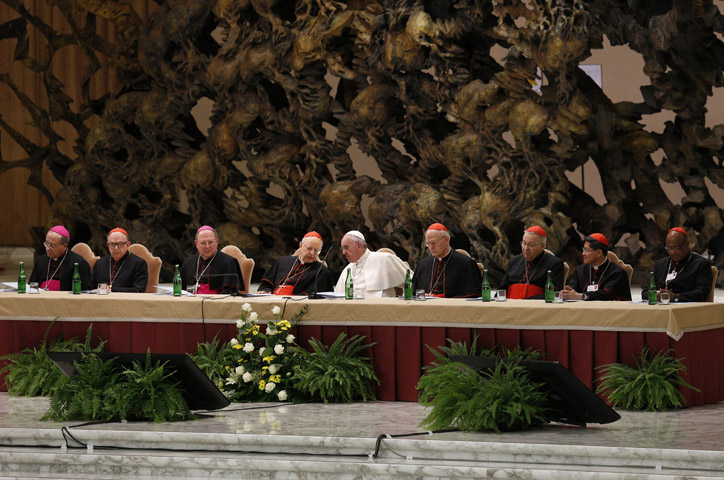
Pope Francis and leaders of the Synod of Bishops on the family and top officials from the synod's general council attend an event marking the 50th anniversary of the Synod of Bishops in Paul VI hall at the Vatican Oct. 17. The pope outlined his vision for how the entire church must be "synodal" with everyone listening to each other, learning from each other and taking responsibility for proclaiming the Gospel. (CNS/Paul Haring)
Earlier in the synod on the family, the so-called conservative faction complained to the pope about procedure, perhaps to preempt whatever document will or will not be completed, and/or published, as the so-called liberal faction maneuvered to open other avenues of discussion, mostly but not always around the question of whether divorced and remarried folks can receive Communion.
It's not as exciting as watching Donald Trump trashing and being trashed by other candidates for the U. S. presidency, but it is close.
You get the impression that they are not talking with each other but rather talking at each other, and that everybody is angrily defending … what?
Goodness. Why can't folks get along? And politics (religious and secular) aside, why do leaders (religious and secular) seem incapable of conversation on important topics? The veiled and not-so-veiled salvos from inside and outside the synod hall are an embarrassing throwback to the early Middle Ages, when synods were even more rambunctious.
Of course, now the powers that be say everybody got together and everything is just fine. Even so, since the thirteen discussion groups have released their final reports, media folks are finding sound bites to support one or another end of the spectrum.
The dividing lines were clear at the start and they remain. Plus, it's a guy thing. Women are outnumbered ten to one at the synod and no woman has a vote.
U.S. Sacred Heart of Mary Sr. Maureen Kelleher, a legal aid attorney and a founder of Network -- the woman-led Catholic social justice lobby the Congregation for the Doctrine of the Faith found suspiciously connected to the Leadership Conference of Women Religious -- pointed out the impasses with her synod intervention and in an interview with NCR.
Kelleher said she "felt the condescension so heavy, you could cut it with a knife."
That is the way it is in the church, and that is the underlying problem. The clerics have a stranglehold even on discussion, in large part because they have set the agenda from their own perspectives. It is not "we are family." It is more Us and Them. If you are an "Us" you know it; if you are a "Them," you feel it.
Kelleher set it out quite clearly in her allotted three minutes. She called on the church to instill a sense of "We." She said, "I ask our church leaders to recognize how many women who feel called to be in service of the Kingdom of God cannot find a place in our church. Gifted though some may be, many cannot bring their talents to the tables of decision making and pastoral planning. They must go elsewhere to be of service in building the Kingdom of God."
Oops. There it is again. Synod member Canadian Archbishop Durocher did recommend a return to the church's tradition of ordaining women as deacons, but Benedictine Abbot Jeremias Schröder reported that the "Us" team basically ignored his thought. Why? Well, for starters, women deacons equal women clerics and could equal women votes in all this.
You see, this is a voting synod, and the numbers are terribly skewed. There are 270 voting members. The men religious, who are not bishops, got ten seats and ten votes; the women religious got three seats and no votes. The men asked to give over some seats to the women religious, but the "Us" team leaders said no.
Which brings us back to Sr. Kelleher, a plain-speaking attorney: "I see a high level of non-acceptance of us" she said, the "'well, she's a woman what else would you expect?' kind of thing."
You have to wonder if that crowd would ever be able to get together to sing "We Are Family."
Then again only three of four Sledge sisters took the stage to sing that very song for the pope during his recent Philadelphia visit. Kathy Sledge, blocked by her sisters from the performance, said something we can all take home: "But in the end, I think things surfaced. … I feel good about that. Until you really get to the truth, that's the first step in real and true healing."
[Phyllis Zagano is senior research associate-in-residence at Hofstra University in Hempstead, N.Y. Her books include Women Deacons: Past, Present, Future and In the Image of Christ: Essays on Being Catholic and Female.]
Editor's note: We can send you an email alert every time Phyllis Zagano's column, Just Catholic, is posted. Go to this page and follow directions: Email alert sign-up.
